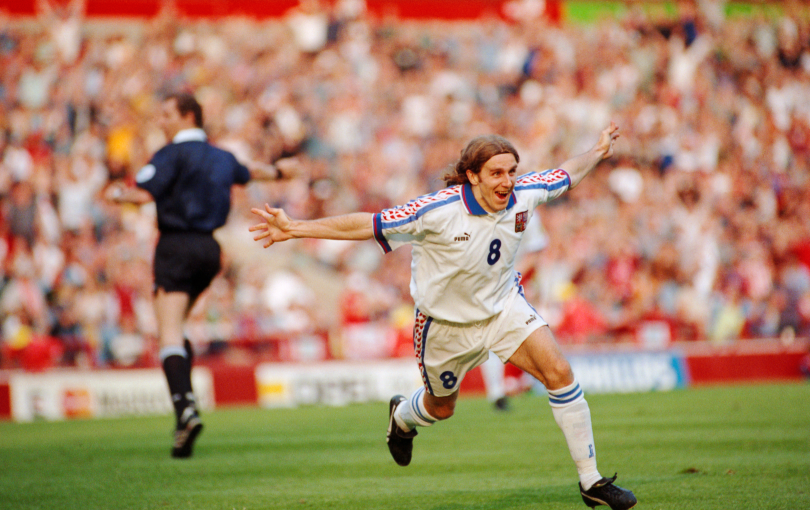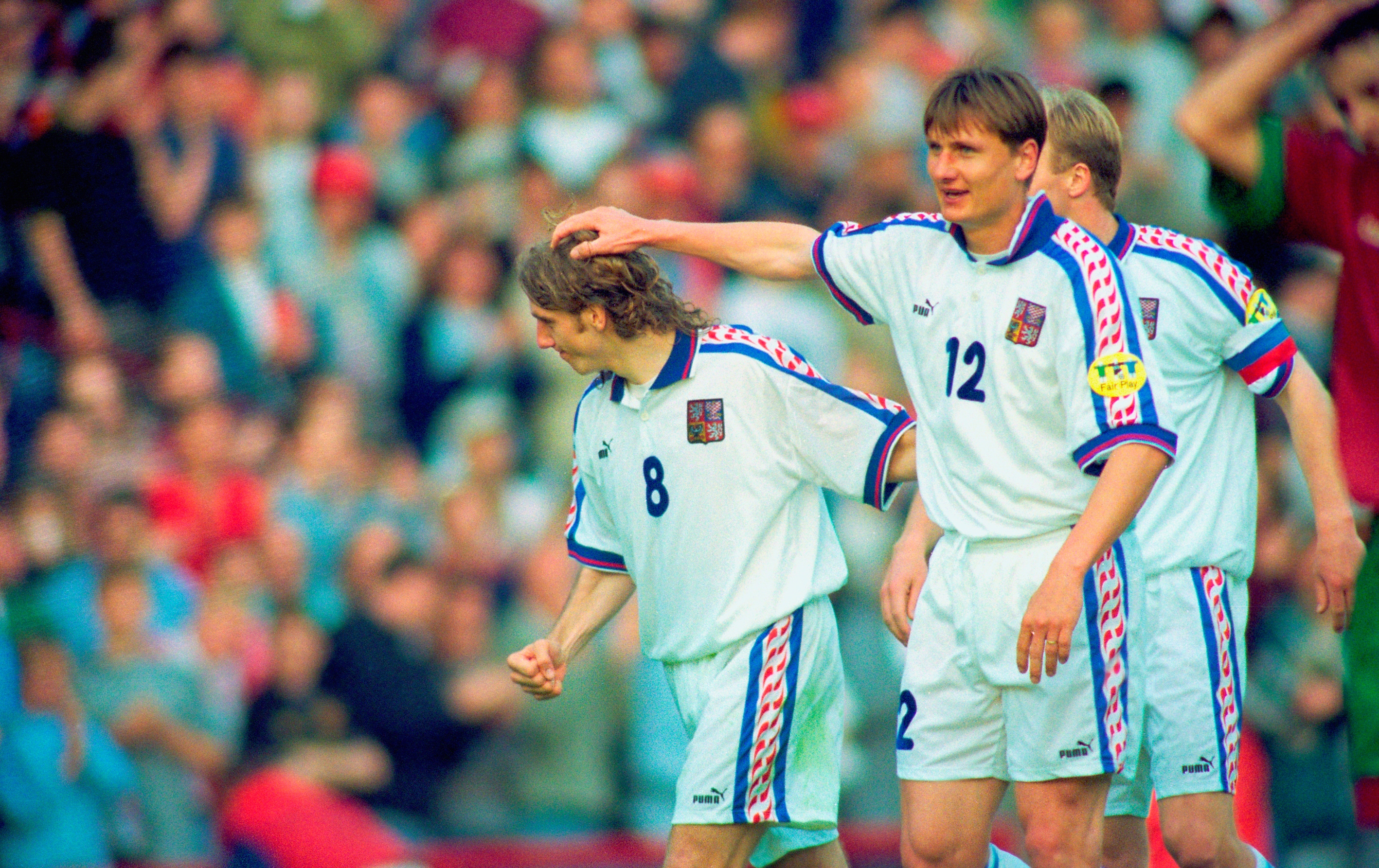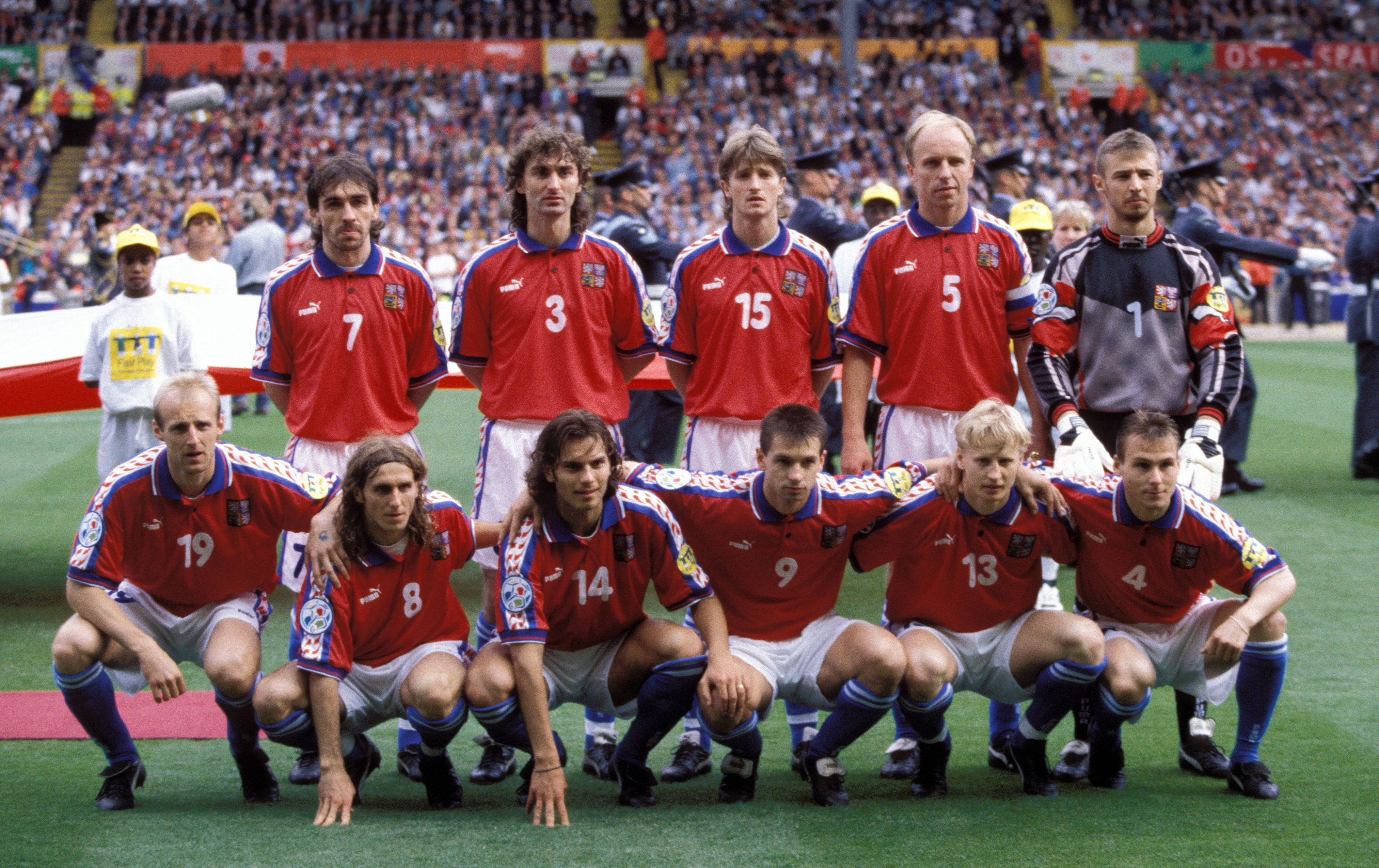"I didn't mean to hit it so high, I thought it was going over!" Karel Poborsky on Euro 96, the goal that changed his life – and his brush with death
The former Manchester United and Czech Republic midfielder explains how he scored one of the most iconic goals of Euro 96 in the quarter-final against Portugal

This feature first appeared in the February 2020 issue of FourFourTwo. Subscribe now and never miss an issue!
Interview by Karel Haring
When I got to Preston with the rest of the Czech Republic squad for Euro 96, we had a feeling that our opponents weren’t taking us seriously. We were going into the tournament as one of the biggest underdogs ever, in a group alongside Germany, Italy and Russia. We were just happy to be there – some of my team-mates didn’t even unpack their suitcases. In our opening match against Germany, we lost 2-0 and I was taken off at half-time. I really struggled. But Euro 96 was a life-changing tournament for me. After that incredible summer, nothing was the same as it had been before.
I grew up in the communist regime of Czechoslovakia, and made my senior debut for Ceske Budejovice at 17 – I had to be at the factory at 7am the next morning, because I was studying to be a car mechanic. The state supported sport so we had no reason to complain, although footballers weren’t allowed to go overseas before they were 30.
After the fall of communism in 1989, we could finally travel and see a different world – but it wasn’t my main target to move abroad. First I signed for Viktoria Zizkov in 1994, and scored 10 goals there before joining Slavia Prague the following summer.

The year of 1996 was crucial for my career, and not only because of the Euros. Before the tournament, we’d experienced an extraordinary season at Slavia, winning the league after a 49-year wait. It meant the world to all the supporters. We reached the UEFA Cup semi-finals too, only losing to Zinedine Zidane’s Bordeaux.
I made my international debut in early 1994, in the Czech Republic’s first match following the split of Czechoslovakia. There was euphoria ahead of that game in Turkey – we travelled by coach from the airport with journalists on board. Some of them had to stand because it was so crowded – it was quite funny when you compare it to these days. We won 4-1 and I got two assists.
Get FourFourTwo Newsletter
The best features, fun and footballing quizzes, straight to your inbox every week.
But it didn’t all go smoothly when qualifying for Euro 96 started. We lost to a last-minute goal in Luxembourg in our sixth game, which was a truly embarrassing defeat. We received a lot of criticism, and rightly so. That Czech team regularly dropped points against underdogs, but did much better against the favourites. The Netherlands were a good example: we beat them 3-1 at home and drew 0-0 in Rotterdam, and finished ahead of them to win our qualifying group.
Euro 96 didn’t begin well for us. We played a 4-4-2 formation in our opening match against Germany, with me next to Pavel Kuka upfront. I was poor at heading, though, so when we sent long balls forward, it was impossible for me to win them against the German centre-backs. Our manager Dusan Uhrin replaced me at half-time – we lost 2-0 and our game plan didn’t work at all.
There was a heated atmosphere in the dressing room afterwards – I’d never played as a forward before, and I never played there again. Patrik Berger started on the substitutes’ bench, despite playing in most of the qualifiers, and there was a lot of discussion about that. Actually, there’s a famous photo of Uhrin and Patrik sitting in the garden of our hotel in Preston, clearing the air.
We changed the system for the next match and our performances improved, even though we still needed some luck to get through the group stage. We faced Italy in our second game, and it was pivotal for us. We couldn’t afford to lose. We went 1-0 up after just five minutes thanks to a Pavel Nedved goal, but Enrico Chiesa equalised. Then Italy had a man sent off and Radek Bejbl put us 2-1 in front. Our goalkeeper, Petr Kouba, made several important saves – we were fortunate, to be honest, although we’d played better and showed more togetherness.
Our last group game against Russia ended up being a crazy match. We went 2-0 up but lost the lead and were close to going home – 3-2 down with five minutes to go. Again, we were lucky: Vladimir Smicer’s shot went through two players’ legs and in. Two nutmegs!
We were through to the last eight and playing Portugal at Villa Park. One look through their squad list told you how good a team they had. Luis Figo, Rui Costa, Fernando Couto, Vitor Baia – it was one of the best teams in Portuguese history. We had to defend for most of that game and Kouba kept us alive. Our plan was simple – rely on counter-attacks – but we only had a few. We were playing anti-football.
Then, eight minutes after half-time, the ball came to me on a rare counter-attack. I was surrounded by defenders, but I saw Baia too far from his goal. There wasn’t room for a direct shot, but an idea came to my mind automatically. I’d always liked finding new ways of finishing. I wasn’t physically powerful, so I tried to find solutions in front of goal using my technical skills. I’d done something similar for Viktoria Zizkov, so when I saw Baia out of his goal, I got my instep completely below the ball – it was more like ‘throwing’ it than kicking it.
It wasn’t my intention to loop the ball quite so high, but it bounced a bit on the grass. I feared it was going over – it was such a high lob – but luckily it went in. In that moment, my first thought wasn’t about the beauty of the goal – I just felt happy that we were winning.
At the final whistle, there was pure jubilation in the squad. We were still in the tournament, when other countries with stronger teams had already gone out, and France were our opponents in the semi-finals.It was more of a tactical battle than entertaining football, but we got through after a penalty shootout. I was pretty nervous before taking my penalty. I didn’t consider myself a spot-kick expert by any means, but I scored. When Reynald Pedros missed for France, we were in the final – against Germany once again.
We’d lost to them in our first group match, but it was different now. We felt more confident and knew many English people wanted us to beat the Germans! There was such a buzz around with the Queen on the pitch, and our president Vaclav Havel was there. I didn’t realise in that moment how special it actually was. When I see photographs of the pre-game ceremony, it still makes me emotional. For many years, the only feeling I’d carried was the bitterness of our eventual defeat.
We were convinced we could beat them this time, and took the lead after an hour. I was quicker than Matthias Sammer, and he fouled me for a penalty. To be honest, the foul was just outside the box, but I fell into the area. I think long-jumpers would have liked my fall – I wanted to be fouled in the penalty area!
When Berger smashed home the penalty, we believed we could win. But the pressure from Germany became more and more intense, and it was no surprise when Oliver Bierhoff headed in the equaliser. I got substituted after 88 minutes so had to watch extra time on the bench, but it didn’t last long as Bierhoff scored the Golden Goal.
Some people think Kouba made a mistake for Bierhoff’s winner, but I don’t agree because the ball was deflected. He would have saved it 99 times out of 100 – just not that time. Still, without him we wouldn’t have reached the final. He had an outstanding tournament, but most fans only remember the end.

Losing was so hard to take. It seemed like the worst thing that could happen to you. We returned to Prague and received a special welcome from fans in a crowded Old Town Square, but it was a long time before the scars on my soul were healed.
At club level, though, a lot of teams wanted to sign me – Bordeaux in France, some teams in Spain, five or six clubs in Italy and several in England. But when Manchester United’s offer landed on the table, it was an obvious choice to make.
I’d met Alex Ferguson during the tournament. He came to our hotel in London a few days before the final and asked if I’d be interested in joining United. I said yes, so negotiations began. I was focused on the final against Germany, but I was so honoured that someone like him went to London just to meet me for two or three minutes – that’s all it took. He wished me good luck for the final, too.
Moving from Slavia to United in the mid-90s, it was like two different worlds. It was a massive step in my career, and in my life. United had a great squad, but I didn’t speak English and the language barrier was the biggest issue. Growing up in Czechoslovakia under the communist regime, English wasn’t taught in grammar schools – we only learned Russian. It was easier for players who arrived from other countries and could speak English. That was the case for Ole Gunnar Solskjaer, who joined United that same summer. When you go somewhere new, the first two or three months are so important to make a good impression. It’s not ideal when you can’t communicate properly.
Ole was friendly, and many of the players were helpful. Eric Cantona was one of them – a cool guy, and very calm in the dressing room. He always told me that if I needed something, he’d help me. Sometimes the better the player, the more normal the person – and what a player he was. A genius.
In the end, I was there for just 18 months. It was almost impossible for me to secure a regular place in the starting line-up ahead of David Beckham, at the beginning of his amazing career. But I don’t feel any bitterness. The players accepted me and I always tried my best, even though I only came on for the last 20 minutes of games. I didn’t have a problem playing for the reserve team – Jordi Cruyff refused to.
When I got a chance to play for the first team, I tried to convince the manager of my qualities. My best match was probably against Leeds – I scored one goal, later voted goal of the month, and set up a couple. But every match at Old Trafford was special. We won the league title and I loved the celebrations. Newcastle gave us a guard of honour and Pavel Srnicek, my international team-mate, congratulated me.
But I wanted to play regular football. There was massive expectation on me when I played for the Czech Republic. People expected miracles from me, because I was playing for one of the best clubs in the world, but I lost my rhythm and my performances weren’t at the same level. We didn’t qualify for the 1998 World Cup.
I sat down with Ferguson and told him that even though I was at the best club in the world, it didn’t make me completely happy – I longed to play regularly. He understood and tried to find me an English club on loan – like Leeds or Sheffield Wednesday – but I signed for Benfica.
I’ll never forget my time with United, though. I still go there regularly and play for the legends team. I always enjoy it, especially after what happened to me in 2016 – exactly 20 years after Euro 96.
Czech TV invited me to be a pundit for the final of Euro 2016. When I arrived, I’d already started feeling like half of my face was paralysed. I shouldn’t have gone. The next morning, people who know me closely were asking if I was all right. They knew something was wrong.
I decided to see a doctor on the Monday, the day after the final. If I’d gone on the Tuesday, it might have been too late. The diagnosis was serious: I had Lyme disease and a brain infection, probably caused by a tick hidden in my beard. They put me into a coma. When I woke up in the hospital, they asked what my name was and if I could recite the five times table. They were worried that I wouldn’t be able to articulate properly again, because some people have never returned to a normal life after getting that illness.
I’m lucky that I don’t suffer from any big complications. Sometimes I have a few problems with my memory, but nothing more than that. It was tough, though. I spent almost a month quarantined in hospital on powerful antibiotics, directly to the veins. I couldn’t eat – food fell out of my mouth because the muscles were still too weak. After that, I spent two more months in rehabilitation. After that kind of situation, you realise life is transient. I was used to overcoming pain as a player. My motto was, ‘What doesn’t kill you makes you stronger’. Now I try to enjoy every day with my family and friends. I’m happy, working as the academy director for the Czech Football Association.
I played for the Manchester United legends team recently, and Alex Ferguson gave a half-hour speech. It was emotional. He spoke openly and sincerely about his brain haemorrhage. Then we had a chat and he asked how I was. Suddenly, he almost started to apologise for the fact that my United career lasted only a short time. But there was no reason to say sorry. I have no regrets.
As for my goal at Euro 96, Antonin Panenka once said he was proud of his famous penalty to win Euro 76 for Czechoslovakia, but also a bit angry because it overshadowed all of his other goals. I can understand how he feels. I’m still asked about my goal in every interview.
But I remember going to Indonesia, and when the passport control officer opened my book, he asked: ‘Are you the Poborsky who scored that goal?’ I’m very proud that it made me famous around the world.’’
Subscribe to FourFourTwo today and get a free England Euro 96 shirt!
NOW READ
CZECH REPUBLIC AT EURO 2020 Full 26-man squad
FOR YOUR HOME Euro 2020 wall chart: Download free with full schedule, fixtures and dates
